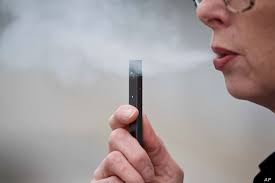I offer a disclaimer to begin this article. I am not an expert on vaping, nor do I claim to be. I am not writing this article to shame anyone on the decisions they make, and I am not writing this article to provide solutions to a very complicated problem, though I will propose one solution that I can not prove the effectiveness of. I am writing this article from the perspective of a student who has lived in Chatham his whole life, as well as someone who has grown up watching the anti-drug campaigns of our generation.
Some of my earliest memories are of anti-smoking presentations given throughout my years at Southern Boulevard and Lafayette. The message was clear and simple—just say no. It was an easy message to get behind as a kid. We were shown videos of black lungs and cancer patients begging us to stay clear of the path that brought them to where they are now. Smoking was down—nearly gone in some areas by the time I was learning about it, in part thanks to this education. Smoking wasn’t seen as something cool to do, but instead as a way to turn your lungs blacker than pavement.
The rise of e-cigarettes has been swift. Decades worth of work to prevent the use of cigarettes seemed to be upended at a moment’s notice. I don’t think that’s an entirely fair statement. Without those campaigns, the kids who are now smoking e-cigarettes could have been smoking regular cigarettes. Still, to someone who went through years of assemblies, presentations, and demonstrations, it seems odd to me how something like e-cigarettes and JUUL could fall through the cracks.
Maybe it has to do with how e-cigarettes were marketed. The visual design between a JUUL and a Nike ad isn’t that different. The way JUUL uses bright neon colors and young models to make the product look as visually appealing as possible is very common in marketing in the digital age. So maybe that plays a factor. Maybe it’s because people aren’t informed about vaping. From my memories of all those anti-smoking presentations, there was this huge fear what the contents of cigarettes actually held. From tar to arsenic (found in rat poison), we were scared from a young age of all the deadly carcinogens that cigarettes had to offer.
Maybe it’s something small—stupid even. Maybe part of it just has to do with us calling it vaping. Vaping is a new term; it doesn’t have the same connotation of smoking, of choking on puffs of smoke, of dying from lung cancer at a young age. As people, we tend to make mental shortcuts, ways to categorize what we like and what we don’t, what’s good for us and what isn’t. It’s why when asked to identify someone we’ve just seen, we tend to go for something simple like eye or hair color over the shape of their nose. Vapes don’t look like cigarettes. That wasn’t an accident. It would have been easy to make a vape look like a cigarette rather than something more similar to a USB stick.
Maybe vaping shows us something bigger than a third-grade health class—bigger than Chatham even. In a time when opioids are ravaging the poorer areas of America, a very different drug crisis exists in towns like Chatham. It’s no coincidence that e-cigarettes are the problem of towns that can afford them. The financial cost of e-cigarettes cannot be understated. Addictions aren’t cheap, and e-cigarettes are far from the exception. Even when we talk about the health consequences of vaping, nicotine should still be at the top of the list. Even if an e-cigarette addiction doesn’t seem like a problem to many kids now, decades down the line many may still not be able to quit.
At the start of this piece I said I would propose one solution that I cannot prove the effectiveness of. I believe that the school has made good steps. Being able to get help from the school without being subject to punishment is a great step. The worst thing we as a school community can do is isolate those who need and want help. The one solution I will throw out is the use of vape detectors in the school bathrooms, a solution that multiple other schools have recently implemented. While the detectors are not perfect, I see them as the best solution to a problem that is not as simple to solve as moving those who are vaping out of the school bathrooms.
I enjoy learning about history. I have for as long as I can remember. I think I enjoy it because I see history as a study of how people respond to crises. How a group of people reacts to a crisis that they have never seen before. Then, watching another group of people, on the other side of the world, deal with a similar problem. Addiction is nothing new. We’ve known about addiction for thousands of years, known what it can do to those around us, know what harms can result if those addictions go unchecked. Addiction will never fully go away, but we all have the power to do our part to help those around us. I don’t know how this problem will be solved, but maybe, just maybe, all of us can be a part of the solution.

